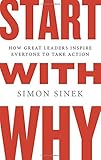The main takeaway is that you want internal motivation, not external!
I found my internal motivation through finding my "why", read "Start with why" for an explanation http://www.amazon.com/Start-Why-Leaders-Inspire-Everyone/dp/...
After getting out on top after my turnaround, Simon Sinek's "Start with why" helped me figure out why I am running my business the way I am, and how I can use that to do even better : http://www.amazon.com/Start-Why-Leaders-Inspire-Everyone/dp/...
And his book: http://www.amazon.com/Start-Why-Leaders-Inspire-Everyone/dp/...
People don't buy Apple stuff because of what it is -- the identical hardware can be bought for sometimes 50% cheaper from other stores/manufacturers. People buy because of the perception that Apple has values which are aligned with their own.
The most visible value is that Apple challenges the state of normalcy in whatever industry they enter, that they oppose the status quo. This is a perception, it doesn't necessarily align with the reality of their actions (for example, how is it opposing the status quo to pay the labels' extortion fees?)
You don't have to agree with it -- that is, you don't have to believe that Apple actually challenges anything -- but you should at least understand how they sell themselves and how that drives their business. If you simply examine Apple on the basis of the products they sell, you can't develop a consistent theory that explains their success (IMHO).
Look at the commercial for the Playbook, it focuses on what the actual hardware/OS can do: run multiple apps at the same time, browse with Flash, etc. At the same time, the iPad commercial focuses on how amazed you'll be, and how much potential it has to change the future. It's audacious -- could you imagine how ridiculous it would sound if RIM billed the Playbook as "just getting started"? That's not RIM, they're not visionaries and they've never sold themselves as such. They sell themselves as people who sell enterprise solutions -- i.e., they identify themselves with what they make.
You have to consider that Apple primarily sells a belief, and secondarily sells products which demonstrate that they implement those beliefs.
I would modify your initial statement -- companies fail when they are reduced to selling commodities, instead of following their values. Dell and HP sell commodities, but Apple takes that same hardware (laptops, desktops, MP3 players, tablets) and turns it into gold, because they sell users the perception of following their values.
(If you liked the foregoing analysis, it's largely influenced by the writings of Simon Sinek in Start With Why: How Great Leaders Inspire Everyone To Take Action http://www.amazon.com/Start-Why-Leaders-Inspire-Everyone/dp/...)

Indeed, there's a reason why it has become an accepted and well-used tool in the management toolbox.[1][2] It's something we shouldn't stop doing as adults.
https://en.wikipedia.org/wiki/5_Whys https://www.amazon.com/Start-Why-Leaders-Inspire-Everyone/dp...